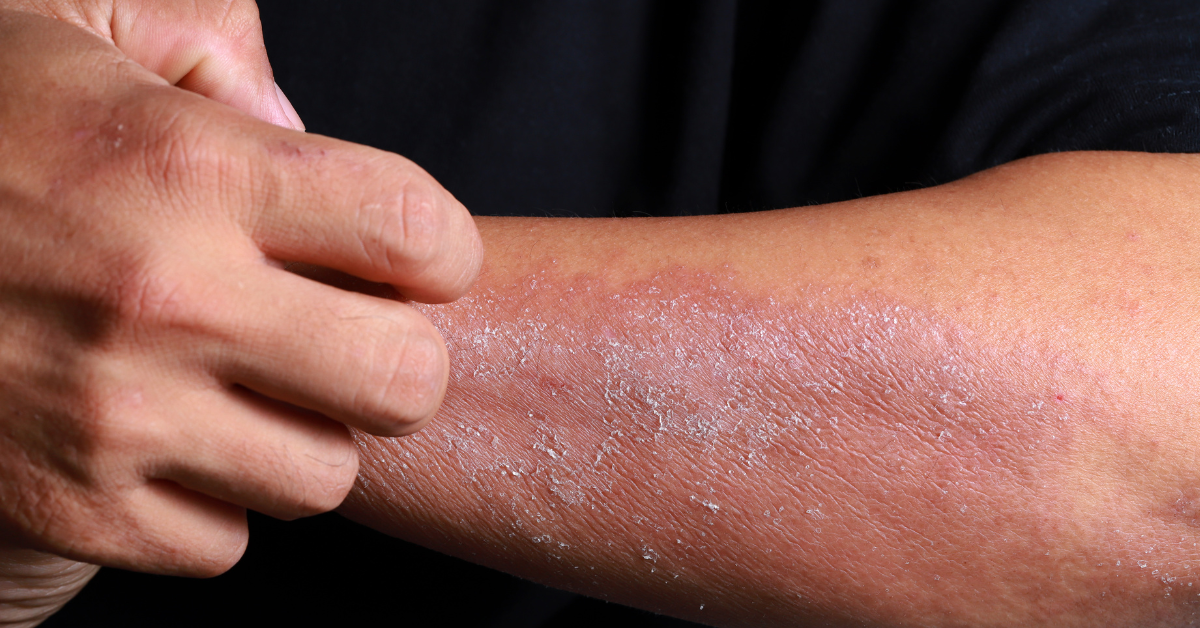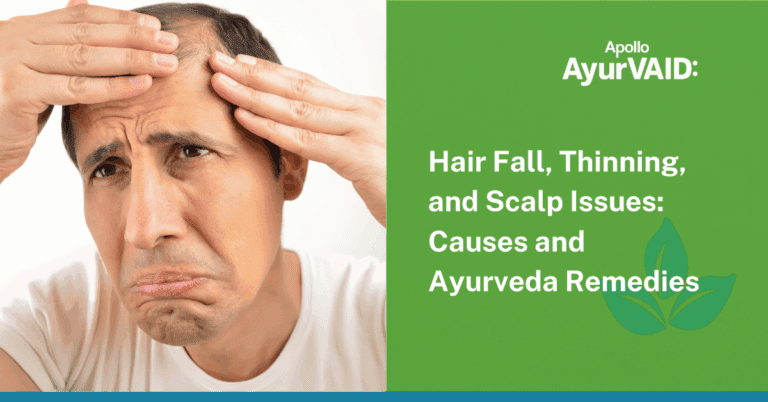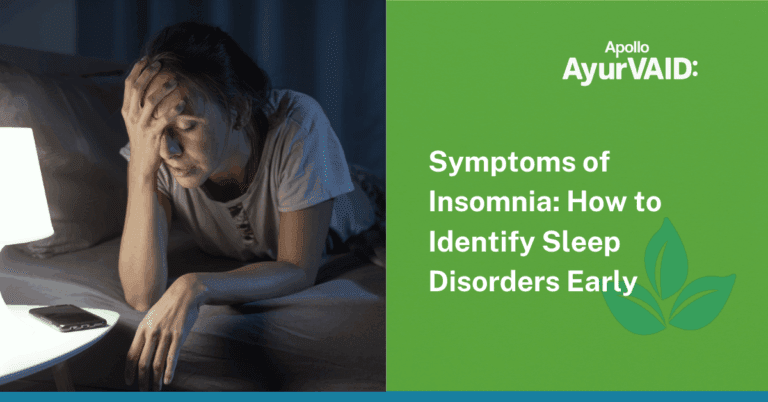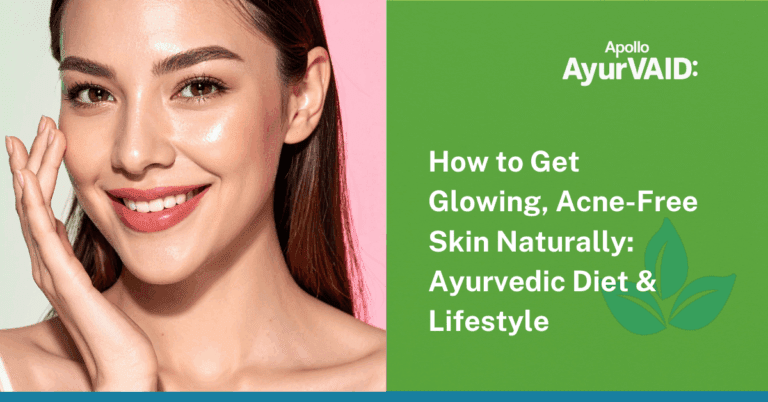
Understanding Eczema Symptoms
- The manifestations of eczema can vary, but generally include hallmark signs.
- Dry skin having red scaly patches, and pain with very intense itching.
Oozing vesicles, papules, crusting, and scaling are also common features. - The sites of manifestation vary from age to age, which causes the infants to develop signs and symptoms over the scalp, cheeks, face, and limbs.
- The adults manifest signs and symptoms on the head, hands, feet, and neck.
Ayurveda describes the eczema symptoms of Vicharchika with similar features. Acharya Charaka says skin lesions with Kandu (itching), Pidaka (boils or blisters), Shyava (darkness or bluish-black discolouration), and Bahusrava (profuse oozing or discharge). Other classical mentions include painful and dry lesions with mild or moderate itching, to blackish lesions with severe itching and watery discharge. Common symptoms of Raji (scales), Rukshata (dryness), and Ruja (pain) constitute the main features. These conditions largely impair the quality of life of the affected p
What Causes Eczema to Spread?
Eczema, especially on the palms of the hands, is influenced by multiple factors, both endogenous and exogenous.
- Allergens such as metals (nickel), fragrance, or chemicals will give rise to allergic contact dermatitis.
- Irritant contact dermatitis is usually caused by frequent contact with water, dirt, and detergent.
- Some workplaces where the person gets exposed to water/ liquid frequently increase the risk of hand eczema.
- An individual having a history of atopic dermatitis or other allergic states will also be at an increased risk.
- Environmental factors, encompassing weather changes and increased humidity, can pathologically contribute to the condition.
Eczema Treatment and Prevention in Ayurveda
Ayurveda provides a comprehensive approach to eczema treatment, with great prevention and identification of the etiological cause of the disorder. Vicharchika is generally regarded as Kapha-predominant Tridoshaja Vyadhi (a disorder affecting all three Doshas with predominance of Kapha), though some texts also define it as Pitta-predominant.
Ayurveda eczema treatment encompasses Shodhana Chikitsa (purification therapy), Shamana Chikitsa (palliative therapy), and Rasayana Chikitsa (rejuvenation therapy), along with strict compliance with Pathya Ahara and Vihara (wholesome diet and lifestyle) and avoidance of Apathya Ahara and Vihara (unwholesome diet and lifestyle).
Shodhana Chikitsa is intended to remove morbid Doshas from the body, which is important since Vicharchika is usually regarded as incurable without treating the imbalances. Based on the leading Dosha, individual purification procedures such as Vamana (emesis) in case of Kapha predominance or Virechana (purgation) in the case of Pitta predominance are done. Blood-letting is greatly valued as a useful treatment for skin conditions.
Shamana Chikitsa follows Shodhana to remove any residual Doshas and involves both internal and external applications. This includes various internal herbal preparations and topical applications like creams, liquid sprinklings, dusting powders, medicated dips, and fumigation for affected skin areas.
Rasayana Chikitsa plays a vital role in preventing recurrence, especially in chronic conditions. This therapy nourishes the body’s tissues and is particularly indicated for long-standing diseases. Research has established that the inclusion of rejuvenation therapies with conventional Ayurvedic management will go a long way in decreasing the rate of recurrence of eczema. In one study, it was illustrated that although including a rejuvenation therapy with a particular treatment combination yielded complete remission in 22.6% of patients, it surprisingly halted the recurrence of the disease in 89.5% of patients. Although a permanent cure for eczema in Ayurveda is not available, intermittent detox and strict compliance with diet and lifestyle modification, as well as drugs, are known to stop the progression of the disease, recurrence, and exacerbations.
Pathya (Good Diet and Regimen) is essential to control and avoid the disease. This includes eating light food, bitter greens, old grains, certain meats, and certain pulses. Good habits include certain oil uses and medicated shampoos.
Apathya (Unwholesome Diet and Habits), to be shunned, are heavy foods, too much milk and dairy products, sour foods, curd, some meats, fish, jaggery, sesame, and salty or spicy ones. Daytime sleep, too much sweating, excessive exercise, stifling natural urges, and improper behaviour are the unwholesome habits to be shunned.
Top Eczema Prevention Tips: How to Stop Hand Eczema from Spreading
Proper prevention of hand eczema, as well as eczema overall, is best achieved with a multi-faceted approach combining the lessons of both contemporary and Ayurveda techniques:
- Maintain Skin Hydration: Frequent and regular moisturising is critical. Applying moisturisers 3 to 4 times a day, particularly after hand washing, can sharply lower the frequency of hand eczema. This ensures the continuity of the skin’s protective function and its moisture.
- Recognise and Stay Away from Triggers: Be careful to identify and reduce exposure to recognised irritants and allergens, e.g., strong soaps, detergents, chemicals, and certain environmental conditions. Use gentle, fragrance-free cleansers.
- Wear Protective Gloves: While performing tasks that involve irritants or wet work, wear protective gloves. Filling cotton gloves with rubber gloves can give extra protection and comfort.
- Hand Hygiene: Cleanliness is essential, but excessive washing of hands, particularly using hot water, may irritate eczema. Wash hands with lukewarm water and apply moisturiser every time afterwards.
- Healthy Diet: Adopt Ayurveda dietary suggestions by consuming light and bitter food, old grains, and avoiding incompatible food pairings, heavy food, too much dairy, sour foods, and hot or salty foods.
- Stress Management Strategies: Flare-ups can be caused by stress. Inculcate soothing practices like meditation or yoga, and get proper rest and sleep to promote healthy skin.
- Think of Ayurveda Detoxification: With the help of a trained Ayurveda practitioner, detoxification treatments can balance the doshas of the body and flush out toxins, leading to long-term prevention.
Becoming knowledgeable about your triggers for eczema and the value of regular preventive strategies is critical, particularly within occupational environments.
Conclusion







